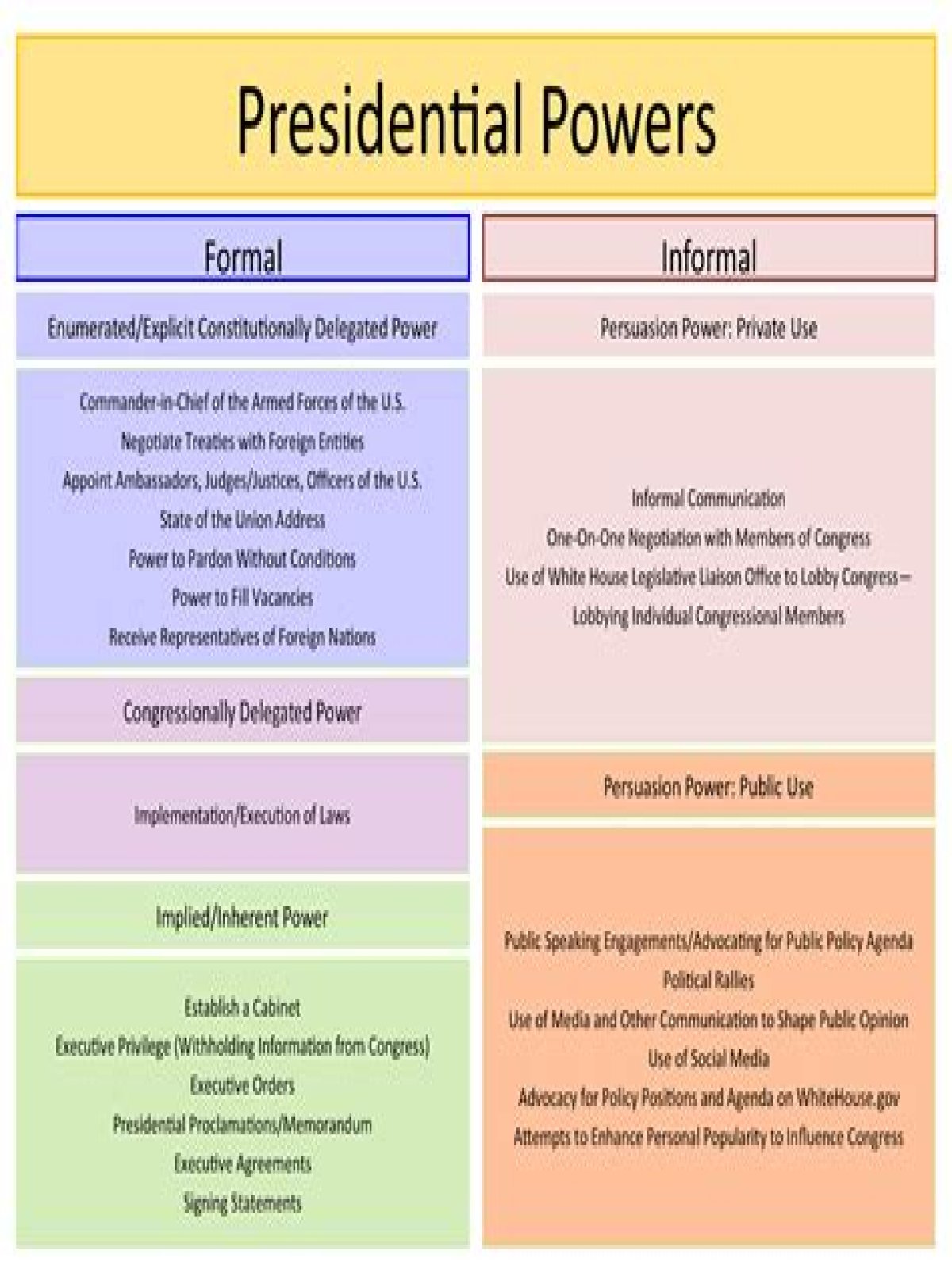The Constitution explicitly assigns the president the power to sign or veto legislation, command the armed forces, ask for the written opinion of their Cabinet, convene or adjourn Congress, grant reprieves and pardons, and receive ambassadors.
The power to go public, power of persuasion, make executive agreements, issue executive orders, issue signing statements, create & use bureaucracy, personality and leadership, and make legislative proposals.
What are informal powers the president has?
Foreign Policy: INFORMAL power, make executive agreements (deal between to heads of state, no Senate approval needed)Signing Statements: informal power that informs Congress and the public of the president’s inter[retation of laws passed by Congress and signed by the president.
What is informal power?
Informal Power – power that is not tied to any position, often resulting from personal characteristics. This power allows the person/group to influence and/or represent a community without formal decision making.
What are formal and informal powers and where do they originate?
The powers of the president outlined in Article II are known as formal powers, but over the years presidents have claimed other powers, known as informal powers. Presidents campaign for office based on their policy agendas: the things they promise voters that they will attempt to accomplish while in office.
What are the formal powers of the president quizlet?
The president has the following powers: To propose legislation to Congress.To submit the annual budget to Congress.To sign legislation passed by Congress.To veto legislation passed by Congress.To act as chief executive.To nominate executive branch officials.To nominate federal judges.
Are formal or informal powers more important?
Why are informal powers more important than formal powers, particularly to modern presidents? Informal powers are debatable while formal powers are set in the law and have to be followed. Also, the Senate has power to approve treaties with foreign nations.
How do presidents use their formal and informal powers to get their legislative agenda passed?
How do presidents use their formal and informal powers to get their legislative agenda passed? Presidents who can communicate well with Congress use this to try to persuade members of Congress to pass the president’s legislative agenda. They will build coalitions and serve as legislative leaders.
How have presidents interpreted and explained the use of formal and informal powers?
Presidents use powers and perform functions of the office to accomplish a policy agenda. Formal and informal powers of the president include: Signing statements – informal power that informs Congress and the public of the president’s interpretation of laws passed by Congress and signed by the president.
Where are the formal powers of the president listed article and section List 3?
Article II, Section 3 both grants and constrains presidential power. This Section invests the President with the discretion to convene Congress on “extraordinary occasions,” a power that has been used to call the chambers to consider nominations, war, and emergency legislation.
What are the 8 formal powers of the president?
Terms in this set (8) Commander in chief of the armed forces.The power to pardon.3/ the power to appointment (cabinet, ambassadors, federal judges)Required to give the state of the Union Address.General foreign policy power and represent the U.S. abroad.Take an oath to execute the law.
Which is an informal power of the president quizlet?
Informal powers: Public persuasion, establishing bureaucracy, issue executive orders, issue signing statements.
What are the formal and real powers of the President of India?
The president is the Supreme Commander of the Indian Armed Forces. The president can declare war or conclude peace, on the advice of the Union Council of Ministers headed by the prime minister. All important treaties and contracts are made in the president’s name.
